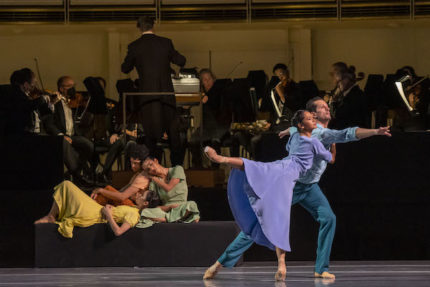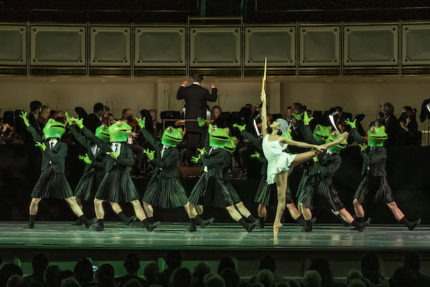CSO and Joffrey join forces for two ballet premieres

On Thursday night at Orchestra Hall, the Chicago Symphony Orchestra and Joffrey Ballet joined forces once again, led by British conductor Harry Bicket. Their only previous collaboration was in spring 2019, and the sequel was an engaging if somewhat unbalanced change of pace from the weekly subscription routine.
The CSO and Joffrey offered two world premiere ballets. The first of these was Heimat, choreographed by Cathy Marston and set to Wagner’s Siegfried Idyll. Wagner’s score was written as a birthday present for the composer’s wife Cosima, and first performed by musicians standing on the stairs leading up to her bedroom. “Heimat” is German for “home,” and Marston’s creation for five dancers—father, mother, and three children—is an affecting evocation of domestic life that sensitively conveys the cloistered intimacy of Wagner’s music.
The ballet begins with the father dancing solo to Wagner’s tentative opening bars while the rest of the family seems to sleep. As the music develops, the other members wake and their individual personalities become more apparent. Familiar family scenes flow into each other to the contours of the Idyll: children squabble for their mother’s attention, there is an interlude for the father and the oldest daughter, and the husband and wife lose and rediscover each other in the fray of childrearing, while all five remain inextricably linked to each other. The overall result is a moving, almost archetypal depiction of the joys and sorrows of family life.
The one significant issue was the extent to which the orchestra was forced into a supporting role for this hybrid event. Sequestered at the back of the stage in darkness requiring stand lights, the CSO players were reduced to what amounted to an onstage pit band. While the dancers were amply graceful, at softer instrumental dynamics the sound of their rapid steps on the Orchestra Hall stage were prominent and distracted from the music’s subtleties. Bicket led a flowing account of the Idyll, though there were uncharacteristically pitchy moments among the winds, and the dance was always literally and figuratively center stage.

These dynamics persisted in the second world premiere ballet, Platée by Annabelle Lopez Ochoa, set to Rameau’s Dance Suite from the opera of the same name. Bicket brought this same Suite at his last CSO turn in 2015, when it was welcome to hear the CSO in this seldom played and hugely inventive music. It was harder to appreciate Thursday night with the orchestra in its backup role.
Ochoa’s work calls for a large cast to tell the comic tale of Jupiter’s marriage to the hideous water nymph Platée, in a ruse to placate the jealousy of his wife Juno. Water nymphs in blue dance tempestuously in the opening storm, and Platée herself—danced expertly in drag by Fernando Duarte—is accompanied by a coterie of frogs in kilts. The entire three-act opera’s plot is told in a compact and highly amusing fifteen minutes, culminating in a revised ending where Jupiter gets his just desserts. Bicket drew pristine playing from the CSO, though again, their considerable efforts felt somehow subsidiary.
Marston, Ochoa, and Joffrey artistic director Ashley Wheater were all on hand to receive the enthusiastic applause for their efforts.
The first half was purely orchestral, and the overall impression was workmanlike. Bicket’s treatment of Mozart’s Symphony No. 34 in C Major was genial enough, with a graciously flowing Andantino and sunny outer movements, though he did little to raise the reading above the routine.
This was also the case in Bicket’s rather literal interpretation of Ravel’s Le Tombeau de Couperin, the French composer’s homage to those fallen in the Great War. The score is a showcase for the oboe, and it was almost a relief to learn after several years that principal William Welter is occasionally mortal. There was a flub or two in the swirling Prélude and several notes did not speak in the various extended solos, though Welter still sounds glorious even on an off night.
The program will be repeated 8 p.m. Friday and Saturday. cso.org
Posted in Performances





